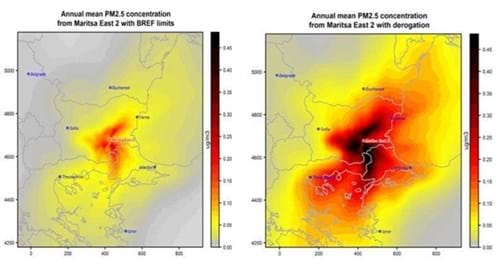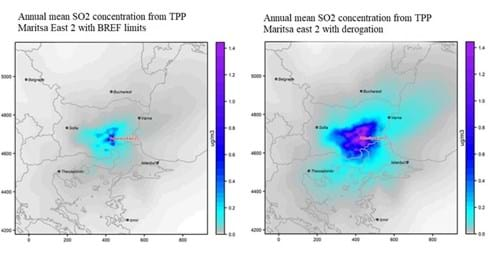Press release: 1 August 2023
Bulgarian supreme court allows coal super-polluter to operate despite recognition it breaches EU law
The Bulgarian state-owned coal power plant Maritsa East 2 gets a free pass to continue to pollute up to four times the legal limit, as the Bulgarian Supreme Administrative Court rules to send the case back to square one after four years of legal battle.
The national ruling follows a decision by the Court of Justice of the EU (CJEU) from March, which said that derogations to pollute above legal limits cannot be granted in areas that are already significantly polluted. The ruling said public authorities have a duty to consider the cumulative pollution that people are exposed to.
While the Supreme court ruling largely accepts these arguments, it falls short of taking a decisive decision and transfers that responsibility back to the regional court, while offering a critique of the stark failures of the first-instance ruling.
In 2018, Maritsa East 2, the biggest coal plant in the Balkans, received an exemption from the new stricter pollution limits set in EU law with a permit to spew nearly double the amount of sulphur dioxide (SO2) and quadruple the volume of toxic mercury.
Both SO2 and mercury have serious health and environment implications – from neurological damage to respiratory conditions.
The case, pursued by Greenpeace Bulgaria and Za Zemiata (Friends of the Earth Bulgaria), with support from non-profit environmental lawyers ClientEarth, had been referred upwards, setting a precedent for some 52 000 industrial facilities across the EU, which are governed by the same rules.
Maritsa East 2 is part of Bulgarian Energy Holding, which is under the direct supervision of the Ministry of Energy. This ministry is also the lead of the energy transition to clean energy in Bulgaria.
Meglena Antonova, office director at Greenpeace Bulgaria said: "Despite this court decision, the government and the state authorities still have a duty to act against inexcusable toxic pollution from coal power plants. People’s lives are at stake, while the national economy also suffers due to the significant health costs associated with preventable pollution impacts. Bulgaria needs forward-thinking policies that support clean, cheap, renewable energy.”
ClientEarth Emissions Reduction Lead Justine Schoenfeld-Quinn said: "This result shows there is still a long way to go to uphold people’s rights, and support national compliance with EU-wide pollution rules. The CJEU’s ruling was clear: national authorities cannot grant exceptions to industrial emissions law when doing so would expose people to illegal levels of pollution. Today’s ruling recognises the Bulgarian authorities’ duty to comply with EU laws to protect public health but passes the buck back to the lower court to enforce those obligations.”
“We urgently need stronger enforcement of industrial emissions law, and the right for individuals to be compensated when industry and authorities fail to respect those laws. Without these, peoples’ right to live in a healthy environment cannot be guaranteed.”
ENDS
Notes to editors:
The case was originally filed in the local administrative court in Stara Zagora. The arguments were based on the Industrial Emissions Directive (IED) and the pollution limits contained within it.
The question was referred to the Court of Justice for the European Union (CJEU) in 2021.
Read ClientEarth’s take on the implications of the CJEU ruling, or the organisations’ joint press release.
In March this year, the CJEU ruled that derogations that allow plants to pollute above legal limits cannot be granted in areas that are already significantly polluted – as is the case in the region surrounding Maritsa East 2.
The CJEU also ruled in May 2022 that Bulgaria was in breach of the Ambient Air Quality Directive (AAQD), attributing the bulk of the pollution burden to high-emitting coal plants.
The Bulgarian government originally opposed stricter pollution laws under the Industrial Emissions Directive (IED).
Maritsa East 2 was the EU’s first coal plant to receive a derogation from updated pollution limits after they came in in 2017. Derogations to other Bulgarian coal plants followed after Maritsa East 2 was granted its permission to bypass EU rules in 2018.
According to the 2018 Last Gasp report by Sandbag (now Ember), Maritsa East 2’s financial burden on the economy from health externalities stacked up to nearly €1 billion in 2016.
According to NASA data from 2019, Bulgaria was the only EU country to rank in the top 20 sulphur dioxide-polluted countries in the world.
Sulphur dioxide (SO2) contributes to serious respiratory conditions and other major health issues. When SO2 is released from a coal plant it also reacts with other chemicals in the air to create ‘particulate matter’ (PM) – an extremely dangerous fine dust that seeps into the bloodstream and threatens health.
Mercury is a highly toxic substance and like SO2, has serious health and ecological implications – threatening lifelong issues to the nervous, digestive and immune systems and jeopardising the development of unborn children.
Maritsa East 2 is the only coal plant owned by state company Bulgarian Energy Holding (BEH) – yet the dirty credentials of this one plant alone propelled BEH into 2018’s top ten most harmful coal companies in the EU. Its staggering pollution levels mean BEH’s pollution footprint is comparable to companies like RWE in Germany, which have multiple sizable coal plants to their name.
Maritsa East 2’s operator Bulgarian Energy Holding claims on its website that the plant “achieves its intentions to be a modern electricity generator responsible for health and environmental protection.”
Opinion (2019): The Balkans’ biggest power station – why thinking beyond Maritsa East 2 matters
The images below (made in 2019) show the projected annual spread of particulate pollution caused by the SO2 from Maritsa East 2 if allowed to function outside of the limits – compared to if it reduced its emissions in line with EU recommendations.

Experts have estimated that one quarter of the projected health impacts will take place in Bulgaria, with three quarters taking place in neighbouring countries – as the above images show. Civil society in Greece has also been putting pressure on during this case, joining Za Zemiata to present evidence of the harm the derogation will cause in northern Greece.
The court decision comes as the EU law on industrial emissions (Industrial Emissions Directive (IED), on which the Bulgarian case is based on) is being revised. Campaigners including ClientEarth have been lobbying for strong limits and the right for people affected by illegal pollution to access compensation.
Bulgaria currently plans to use highly polluting coal until 2038 and lacks ambition to decarbonise the energy sector by 2026 – even with financial support from the Recovery and Resilience mechanism and the Just Transition mechanism.
About ClientEarth
ClientEarth is a non-profit organisation that uses the law to create systemic change that protects the Earth for – and with – its inhabitants. We are tackling climate change, protecting nature and stopping pollution, with partners and citizens around the globe. We hold industry and governments to account, and defend everyone’s right to a healthy world. From our offices in Europe, Asia and the USA we shape, implement and enforce the law, to build a future for our planet in which people and nature can thrive together.


